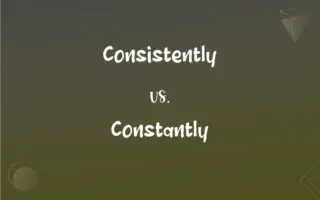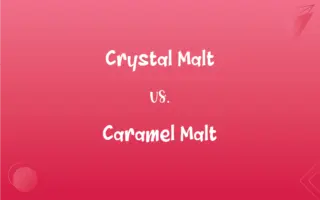Old vs. Young: What's the Difference?
Edited by Aimie Carlson || By Harlon Moss || Published on November 6, 2023
Old refers to having lived or existed for a long time, while young means having lived or existed for a short time.

Key Differences
"Old" and "young" are antonyms in the English language. While "old" signifies something or someone that has been in existence for a significant period, "young" refers to things or beings that are in the earlier stages of their existence.
In the context of age, when we label someone as "old", we often mean that they have experienced many years of life. Conversely, labeling someone as "young" indicates that they have not lived through as many years and have relatively less life experience.
Beyond just age, "old" and "young" can describe objects, ideas, or places. An "old" building might have historical significance and wear, whereas a "young" forest might have newly grown trees after a wildfire.
The descriptors "old" and "young" can also reflect cultural, technological, or historical changes. For instance, "old" technology refers to outdated or obsolete devices, while "young" technology signifies recent innovations.
In literature and art, "old" and "young" can be symbolic. "Old" might symbolize wisdom, tradition, or decay, while "young" can represent innocence, new beginnings, or naivety.
ADVERTISEMENT
Comparison Chart
Definition
Having lived or existed for a long time.
Having lived or existed for a short time.
Age Context
Refers to advanced age or long existence.
Refers to early stage of life or being.
Symbolism
Wisdom, tradition, decay.
Innocence, new beginnings, naivety.
Technological Use
Outdated or obsolete devices.
Recent innovations or advancements.
Cultural Perspective
Associated with past, history.
Associated with current trends, future.
ADVERTISEMENT
Old and Young Definitions
Old
Having lived or existed for a considerable amount of time.
The old tree stood tall in the park.
Young
Having lived or existed for a short duration.
The young puppy was full of energy.
Old
Established or known for a long time.
That's an old tradition in our family.
Young
Early in the process of growth or development.
Spring brings young flowers to bloom.
Old
Showing the effects of time or age.
The old book had yellowed pages.
Young
Lacking experience or maturity.
The young entrepreneur learned from his mistakes.
Old
Of or relating to the past; former.
The old ways of doing things were different.
Young
Representing a new or fresh period or phase.
The company had a young and innovative team.
Old
Out of date or no longer in use.
My computer is too old to run the latest software.
Young
Being in an early stage relative to a lifecycle.
The young wine needs more time to mature.
Old
Having lived or existed for a relatively long time; far advanced in years or life.
Young
Being in an early period of life, development, or growth.
Old
Relatively advanced in age
Pamela is our oldest child.
Young
Newly begun or formed; not advanced
A young biotech company.
FAQs
Can "old" and "young" apply to non-living things?
Yes, for instance, "old" can describe buildings and "young" can describe a newly formed lake.
Can these words be symbolic in literature?
Absolutely, "old" might symbolize wisdom or decay, and "young" might represent innocence or new beginnings.
How are "old" and "young" used in technological contexts?
"Old" refers to outdated technology, while "young" might describe recent innovations.
Can "old" refer to traditions?
Yes, "old" can describe longstanding traditions or practices.
What does "old" generally imply in English?
"Old" usually implies something that has existed or lived for a long time.
What is meant by the term "young"?
"Young" refers to something or someone in the early stages of life or existence.
Can "old" signify something is no longer in use?
Yes, for instance, an "old" method might be one that's no longer practiced.
Can "old" have a positive connotation?
Yes, in contexts like "old wisdom," it can denote valuable experience and knowledge.
Is "younger" the comparative form of "young"?
Yes, "younger" means slightly young or younger than another.
What is the opposite of "young"?
The opposite of "young" is "old."
Are "old" and "elderly" synonymous?
While both refer to age, "elderly" often denotes senior citizens, whereas "old" can be more general.
What does it mean when someone says "young at heart"?
It means the person feels youthful inside, regardless of their actual age.
How are "old" and "young" used in the context of age?
"Old" often refers to advanced age, while "young" indicates a lack of years lived.
Can "young" indicate a lack of experience?
Yes, someone described as "young" in a field might lack experience in it.
Is "youngster" a term for a young person?
Yes, "youngster" is a colloquial term for a child or young person.
Is it accurate to say a "young" company for a newly established one?
Yes, a "young" company implies it's newly established or in its early stages.
How do "old" and "young" relate to animals?
Animals can be described as "old" or "young" based on their age or stage of life.
Is "youth" another word for "young"?
"Youth" typically refers to the period of being young, while "young" is an adjective describing it.
What's the comparative form of "old"?
The comparative form of "old" is "older."
Can "old" and "young" be relative terms?
Absolutely, what's "old" in one context might be "young" in another.
About Author
Written by
Harlon MossHarlon is a seasoned quality moderator and accomplished content writer for Difference Wiki. An alumnus of the prestigious University of California, he earned his degree in Computer Science. Leveraging his academic background, Harlon brings a meticulous and informed perspective to his work, ensuring content accuracy and excellence.
Edited by
Aimie CarlsonAimie Carlson, holding a master's degree in English literature, is a fervent English language enthusiast. She lends her writing talents to Difference Wiki, a prominent website that specializes in comparisons, offering readers insightful analyses that both captivate and inform.






































































